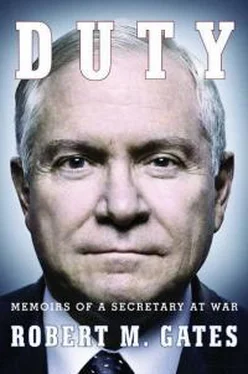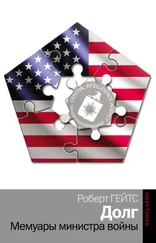Our family of four was close, and my childhood and youth were spent in a loving, affectionate, and happy home. My father was a man of unshakable integrity, with a big heart and, when it came to people (versus politics), an open mind. He taught me early in life to take people one at a time, based on their individual qualities and never as a member of a group. That led, he said, to hatred and bias; that was what the Nazis had done. He had no patience for lying, hypocrisy, people who put on airs, or unethical behavior. In church, he occasionally would point out to me important men who fell short of his standards of character. My mother, as was common in those days, was a homemaker. She loved my brother and me deeply, and was our anchor in every way. My parents told me repeatedly when I was a boy that there were no limits to what I might achieve if I worked hard, but they also routinely cautioned me never to think I was superior to anyone else.
My life growing up in 1950s Kansas was idyllic, revolving around family, school, church, and Boy Scouts. My brother and I were Eagle Scouts. There were certain rules my parents insisted I follow, but within those bounds, I had extraordinary freedom to wander, explore, and test my wings. My brother and I were adventuresome and a bit careless; we were both familiar sights in hospital emergency rooms. I was a smart aleck, and when I sassed my mother, a backhand slap across the face was likely to follow quickly if my father was within earshot. My mother was expert at cutting a willow switch to use across the backs of my bare legs when I misbehaved. The worst punishments were for lying. On those relatively infrequent occasions when I was disciplined, I’m confident I deserved it, though I felt deeply persecuted at the time. But their expectations and discipline taught me about consequences and taking responsibility for my actions.
My parents shaped my character and therefore my life. I realized on the way to the Senate that day that the human qualities they had imbued within me in those early years had brought me to this moment, and looking ahead, I knew they would be tested as never before.
I had been through three previous confirmation hearings. The first, in 1986, for deputy director of central intelligence, was a walk in the park and culminated in a unanimous vote. The second, in early 1987, for director of central intelligence, occurred in the middle of the Iran-Contra scandal; when it became clear that the Senate would not confirm me with so many unanswered questions about my role, I withdrew. The third, in 1991, again to be DCI, had been protracted and rough but ended with my confirmation, with a third of the senators voting against me. Experience told me that unless I really screwed up in my testimony, I would be confirmed as secretary of defense by a very wide margin. An editorial cartoon at the time captured the mood of the Senate (and the press) perfectly: it showed me standing with upraised right arm taking an oath—“I am not now nor have I ever been Donald Rumsfeld.” It was a useful and humbling reminder that my confirmation was not about who I was but rather who I was not. It was also a statement about how poisonous the atmosphere had become in Washington.
Senator John Warner of Virginia was chairman of the Armed Services Committee and thus chaired the hearing; the ranking minority member was Carl Levin of Michigan. The two would switch places in a few weeks as a result of the midterm elections. Warner was an old friend who had introduced me—he was my “home-state senator”—in all three of my preceding confirmation hearings. I did not know Levin very well, and he had voted against me in 1991. Warner would deliver opening remarks, followed by Levin, and then I would be “introduced” to the committee by two old friends: former Senate majority leader Bob Dole of Kansas and former senator and chairman of the Senate Intelligence Committee David Boren, by then longtime president of the University of Oklahoma. Then I would make an opening statement.
Warner focused, right out of the gate, on Iraq. He reminded everyone that after his recent visit to Iraq, his eighth, he had said publicly that “in two or three months, if this thing [the war] hasn’t come to fruition and if this level of violence is not under control and if the government under Prime Minister Maliki is not able to function, then it’s the responsibility of our government internally to determine: Is there a change of course that we should take?” He quoted General Peter Pace, chairman of the Joint Chiefs of Staff, as having said the day before, when asked if we were winning in Iraq, “We’re not winning, but we’re not losing.” Warner commended the various reviews of Iraq strategy under way inside the administration and, in that context, advised me on how to do my job: “I urge you not to restrict your advice, your personal opinions regarding the current and future evaluations in these strategy discussions.… You simply have to be fearless—I repeat: fearless—in discharging your statutory obligations as, quote, ‘the principal assistant to the president in all matters relating to the Department of Defense.’ ” Warner was publicly signaling his weakening support for the president on Iraq.
Levin’s opening statement was very critical of the administration on Iraq and clearly set forth the views that he would bring to the table as chairman of the committee and with which I would be forced to contend beginning in January:
If confirmed as secretary of defense, Robert Gates will face the monumental challenge of picking up the pieces from broken policies and mistaken priorities in the past few years. First and foremost, this means addressing the ongoing crisis in Iraq. The situation in Iraq has been getting steadily worse, not better. Before the invasion of Iraq, we failed to plan to provide an adequate force for the occupation of the country, or to plan for the aftermath of major combat operations. After we toppled Saddam Hussein in 2003, we thoughtlessly disbanded the Iraqi army and also disqualified tens of thousands of low-level Baath Party members from future government employment. These actions contributed to the chaos and violence that followed, and to alienating substantial portions of the Iraqi population. We have failed, so far, to secure the country and defeat the insurgency. And we have failed to disarm the militias and create a viable Iraqi military or police force. And we have failed to rebuild the economic infrastructure of the country and provide employment for the majority of Iraqis. The next secretary of defense will have to deal with the consequences of those failures.
Levin went on to tell me that Iraq was not the only challenge I would face. He spoke of a resurgent Taliban in Afghanistan; an unpredictable nuclear power in North Korea; Iran aggressively pursuing nuclear weapons; the Army and Marine Corps in need of tens of billions of dollars to repair and replace equipment; the declining readiness of our non-deployed ground forces; the continuing pursuit of weapons programs we couldn’t afford; the challenges in recruitment and retention of our forces; the problems of our military families after repeated deployments; and a department “whose image has been tarnished by the mistreatment of detainees in Abu Ghraib and Guantánamo and elsewhere.”
Finally, the man I would have to work with as committee chairman said that the Department of Defense’s effectiveness had been reduced by a civilian senior leadership that “has too often not welcomed differing views, whether from our uniformed military leaders, the intelligence community, the State Department, American allies, or members of Congress of both political parties. The next secretary will have to work hard to heal these wounds and address the many problems facing the department and the country.”
Читать дальше












